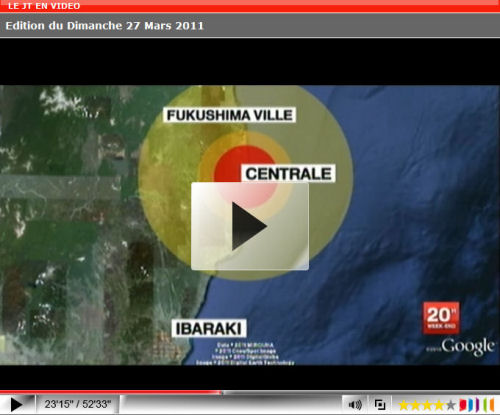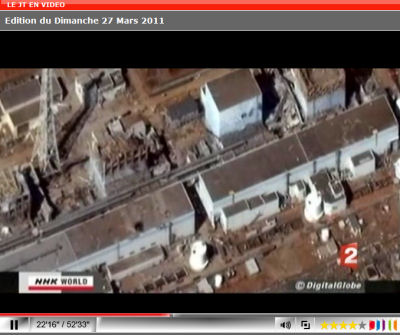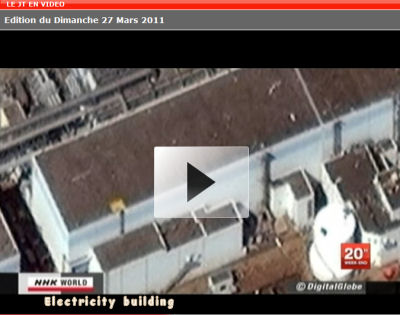Reactor 2 in partial meltdown- French News 27 March 2011

The 2000hrs French news for Sunday 27 March essentially confirms what Tony Boys has to say in his candobetter.net article"Japan Earthquake, Tsunami and Nuclear Disaster - A personal story about the next 100 years of human history". The situation is very bad and could significantly deteriorate at any moment placing much of the North island of Japan at risk to life.

French commentators say that it is very difficult to analyse exactly what is happening due to conflicting and contradictory reports from TEPCO, the managers of the nuclear site in question, near Fukushima city. TEPCO looks incompetent, with a history of falsification of documentation of radiation levels.
Commentators for the French news service say, "The only certainty is that the situation has not improved; it has got much worse."

Sunday's bad news came from the basement of the second reactor's electricity building. The water there is extremely radioactive. 1000 millisiverts per hour - a peak which seems to confirm that the core of the reactor has partially melted and that the housing is not sealed. Official spokespersons from Radiation Protection and Safety in Japan say that they believe the high radiation emissions come from a leak in the reactor. For comparison, nuclear plant workers safety rules say that they should not receive more than 20 millisiverts annually. In accidents and emergencies they may risk up to 1000 millisieverts a year. (Note that the rate at the reactor above 1000 millisieverts an HOUR.) With such high radioactivity, no-one can go near the building. All work has been stopped.
Thierry Charles, Director of the France's Radiation Protection and Safety, commented that the situation cannot continue. [TEPCO] need to bring in seawater to cool it. [Ed. But sea water will cause corrosion of the plant and possibly prevent future cooling by plugging the pipes with salt.] The risk is also to fish, seaweeds, crustaceans within and outside the exclusion zone. These things form the basis of the Japanese diet.
Yves Marignac, "Independent Expert" and Director of Wise Paris, commented that the degree of danger requires an evacuation of at least 40 km from the site, much further than the area prescribed by the Japanese authorities.
This radioactivity in the second reactor is the highest measured since the beginning of the nuclear catastrophy.
Fish sales are down in Tokyo despite fishmongers now importing fish from outside the contamination zone. (This should come as no surprise.) Babies who can afford to are drinking bottled water, since mains-water has become unsafe.
Source: France 2 News, 2000hrs, 27-March-2011 Translation and article by Sheila Newman, Energy, Environment and Population Sociologist.

Recent comments